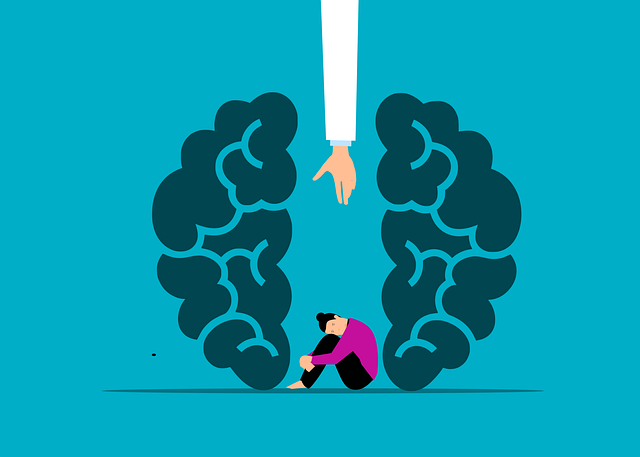Mindfulness meditation, combined with Denver Biofeedback Therapy, offers a powerful approach to enhancing mental well-being. Beginners should create a quiet space and focus on breath patterns to cultivate awareness. Regular practice reduces stress, improves concentration, and promotes positive thinking. A dedicated mindfulness space, inspired by Denver Biofeedback Therapy, fosters peace and emotional intelligence. Techniques like breath awareness and Mental Wellness Journaling deepen the practice. Denver Biofeedback Therapy provides an innovative way to integrate mindfulness into daily life, improving mental health awareness and overall well-being.
“Unwind, find focus, and embrace mindfulness—a powerful tool for enhancing your mental and physical well-being. This comprehensive guide offers a beginner’s journey into mindfulness meditation, exploring its profound benefits and practical application in daily life. From understanding the basics to setting up your serene meditation space, we’ll navigate you through effective techniques.
Discover how Denver Biofeedback Therapy seamlessly integrates mindfulness, offering unique insights for incorporating this ancient practice into your modern routine.”
- Understanding Mindfulness Meditation: A Beginner's Overview
- The Benefits of Regular Practice for Mental and Physical Health
- Setting Up Your Meditation Space: Creating a Peaceful Haven
- Techniques and Exercises to Deepen Your Session
- Denver Biofeedback Therapy: Integrating Mindfulness into Your Routine
Understanding Mindfulness Meditation: A Beginner's Overview

Mindfulness meditation is a simple yet powerful practice that has gained immense popularity, thanks to its potential benefits for mental and emotional well-being. At its core, mindfulness involves training your attention and awareness on the present moment, without judgment. It’s like taking a step back from your thoughts and feelings, observing them with curiosity and acceptance. This practice is not about clearing your mind of all thoughts but rather noticing when your mind wanders and gently guiding it back to the here and now.
For beginners, understanding mindfulness meditation starts with creating a quiet, comfortable space where you can sit without distractions. Set a specific time each day for your practice—it could be in the morning or before bed—and begin with short sessions of 5–10 minutes. Focus on your breath as an anchor to the present moment, noticing the rise and fall of your chest with each inhalation and exhalation. As thoughts arise, simply acknowledge them without getting caught up in them and then bring your attention back to your breath. This practice can be a game-changer for those seeking better stress management, enhanced focus, and increased self-awareness, even helping to boost confidence and promote positive thinking through consistent Denver Biofeedback Therapy.
The Benefits of Regular Practice for Mental and Physical Health

Regular mindfulness meditation practice has been shown to have profound effects on both mental and physical health. Studies have demonstrated its ability to reduce stress, anxiety, and depression, while also improving overall mood and emotional well-being. This ancient technique empowers individuals to cultivate inner strength and resilience, enabling them to navigate life’s challenges with greater clarity and composure. By focusing on the present moment, mindfulness meditation helps individuals become more aware of their thoughts and emotions, fostering better decision-making and conflict resolution techniques in daily life.
In the context of Denver Biofeedback Therapy, mindfulness becomes a powerful tool for enhancing overall health. Regular practice can lead to improved physical health markers such as lower blood pressure, reduced inflammation, and better sleep quality. Moreover, cultivating mindfulness can strengthen the mind-body connection, promoting a sense of balance and harmony that extends beyond the therapy room. Increasing mental health awareness through mindfulness meditation empowers individuals to take control of their well-being, complementing traditional therapeutic approaches for a holistic healing experience.
Setting Up Your Meditation Space: Creating a Peaceful Haven

Creating a dedicated space for your mindfulness meditation practice is the first step towards fostering peace and emotional intelligence in Denver Biofeedback Therapy. Think of it as your personal sanctuary—a place where you can retreat to escape the hustle and bustle of daily life. Consider factors like lighting (soft, warm hues are ideal), temperature, and comfort when setting up your haven. Natural elements such as plants or a small water feature can enhance the calming atmosphere.
A tranquil environment encourages mental health awareness and burnout prevention strategies for healthcare providers, allowing you to fully immerse yourself in the practice. Whether it’s a quiet corner of your home or a secluded spot in nature, ensure it’s a space where you feel safe and at ease. By doing so, you’ll be better equipped to benefit from mindfulness meditation, cultivating a sense of calm and clarity that can positively impact all areas of your life.
Techniques and Exercises to Deepen Your Session

To deepen your mindfulness meditation practice, consider incorporating a variety of techniques and exercises tailored to enhance focus, calmness, and self-awareness. One effective method is Denver Biofeedback Therapy, which combines physiological feedback with mental training to help individuals gain better control over their bodily responses. This can be as simple as focusing on your breath, observing its natural rhythm without trying to control it, allowing you to become more attuned to the present moment.
Additionally, Mental Wellness Journaling Exercise Guidance can significantly deepen your practice. Reflecting on your thoughts and emotions after each session helps solidify the benefits of mindfulness. Writing down experiences, sensations, and insights can provide a clearer understanding of how meditation impacts your mental state. Social Skills Training and Mental Illness Stigma Reduction Efforts also play a role in creating a supportive environment for practicing mindfulness, fostering connections and encouraging continued engagement with this transformative practice.
Denver Biofeedback Therapy: Integrating Mindfulness into Your Routine

In the heart of Denver, Biofeedback Therapy offers a unique approach to integrating mindfulness into daily routines, enhancing mental health awareness and overall well-being. This innovative practice goes beyond traditional meditation by teaching individuals how to gain control over their physiological processes using real-time feedback. By partnering with skilled healthcare providers, clients learn to recognize and manage stress responses, thereby cultivating a deeper sense of calm and focus.
Denver Biofeedback Therapy serves as a valuable resource for those seeking to improve not just their mental health but also their quality of life. It is particularly beneficial for individuals undergoing Crisis Intervention Guidance, as it equips them with coping strategies that can be applied in high-stress situations. The cultural competency training provided by these healthcare providers ensures that mindfulness practices are accessible and tailored to diverse populations, making this form of therapy inclusive and impactful.
Mindfulness meditation, when integrated with the support of Denver Biofeedback Therapy, can significantly enhance mental and physical well-being. By setting up a peaceful meditation space and employing various techniques, you can deepen your practice and unlock its profound benefits. Regular mindfulness sessions not only reduce stress and improve focus but also foster a deeper connection with yourself and your surroundings. Embrace this ancient practice tailored to the modern world and experience the transformative power of mindfulness in your daily life.










